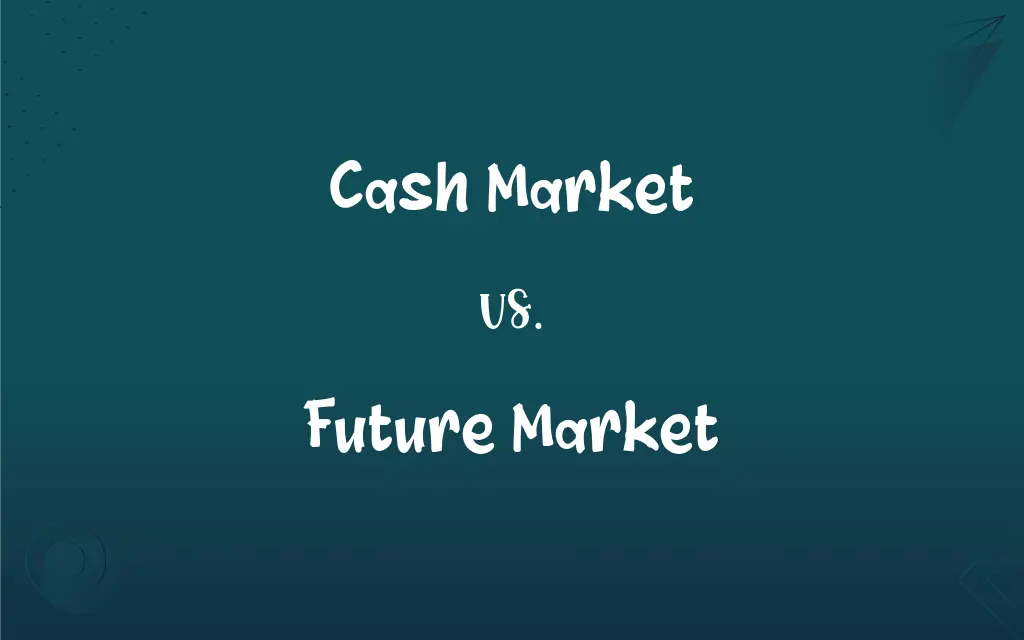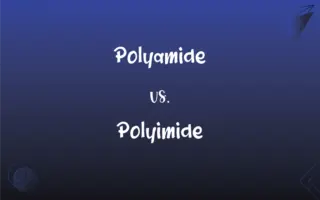Cash Market vs. Future Market: What's the Difference?
Edited by Harlon Moss || By Janet White || Published on November 12, 2023
The Cash Market involves immediate trade and settlement of commodities or securities, whereas the Future Market deals with contracts for future delivery at specified terms.

Key Differences
The Cash Market, often referred to as the "spot market," is where financial instruments or commodities are bought and sold for immediate delivery and payment. Conversely, the Future Market is where participants enter into futures contracts, agreeing to buy or sell assets at a predetermined price on a set future date.
In the Cash Market, transactions culminate in instant settlement, making it crucial for participants to have the necessary funds or assets on hand. In contrast, the Future Market doesn't require immediate settlement since the actual exchange of goods or assets happens in the future based on the contract's terms.
Trading in the Cash Market implies that the buyer and seller are exchanging commodities or securities for immediate payment. On the other hand, the Future Market involves speculating on the price movement of an asset, providing a mechanism for price risk management or hedging.
The Cash Market predominantly caters to those who wish to own or immediately use the commodity or security. In contrast, the Future Market appeals to traders, hedgers, and speculators eyeing potential profits from future price fluctuations.
Prices in the Cash Market reflect the current market equilibrium based on immediate demand and supply. In the Future Market, prices indicate market participants' collective views on where the asset's price will be at the contract's expiration.
ADVERTISEMENT
Comparison Chart
Settlement
Immediate settlement upon trade.
Settlement occurs on a specified future date.
Purpose
Instant trade of commodities or securities for immediate use or ownership.
Speculation, hedging, and price risk management with contracts for future delivery.
Payment
Immediate payment is required.
Payment is deferred to the contract's expiration date.
Price Determination
Reflects the current market demand and supply.
Indicates anticipated future prices based on current information.
Contract Involvement
No contracts are involved, straightforward buy/sell.
Involves standardized futures contracts specifying quantity, quality, delivery date, and other terms.
ADVERTISEMENT
Cash Market and Future Market Definitions
Cash Market
It's synonymous with the "spot market" and demands immediate settlement.
Gold traded in the Cash Market is delivered and paid for on the spot.
Future Market
The Future Market's prices are based on anticipated future values, considering present market information.
If investors expect a coffee shortage, Future Market prices for coffee might rise.
Cash Market
This market is suitable for participants seeking immediate possession or use of assets.
Farmers often sell their harvest directly in the Cash Market for quick turnover.
Future Market
The Future Market deals with contracts stipulating the buying or selling of assets on a set future date.
Traders in the Future Market speculated on oil prices for deliveries six months ahead.
Cash Market
The Cash Market reflects the current price of assets based on immediate demand and supply.
Prices of fresh produce in the Cash Market fluctuate daily based on availability and demand.
Future Market
It facilitates hedging against price fluctuations and speculative activities.
Companies use the Future Market to hedge against potential unfavorable price changes.
Cash Market
The Cash Market is where commodities or securities are instantly bought and sold.
In the Cash Market, Sarah bought shares and immediately paid for them.
Future Market
Settlement in the Future Market is deferred to the contract's expiration, unlike immediate settlements.
A trader can sell a futures contract without owning the asset until the contract's maturity in the Future Market.
Cash Market
It doesn't involve contracts; trades culminate with on-the-spot payment.
Buying a gadget in the Cash Market means you pay and receive it then and there.
Future Market
Contracts in the Future Market are standardized, detailing quantity, quality, and delivery specifics.
The Future Market allows agricultural producers to lock in prices for their future crops.
FAQs
What does the Cash Market primarily deal with?
The Cash Market deals with the immediate trade and settlement of commodities or securities.
Can the Future Market help protect against price changes?
Yes, one of its main functions is hedging against potential price fluctuations.
Does the Cash Market involve any future obligations?
No, transactions in the Cash Market are immediate, with no future commitments.
Is the Future Market only for professional traders?
While it attracts many professional traders, it's also used by producers, hedgers, and other market participants.
How is the Future Market distinct from the Cash Market?
The Future Market revolves around contracts for the future delivery of assets at agreed-upon terms.
Do I get immediate ownership of an asset in the Cash Market?
Yes, transactions in the Cash Market lead to immediate ownership and delivery.
Are the prices in the Cash Market and Future Market always the same?
No, Cash Market prices reflect current demand and supply, while Future Market prices project anticipated future values.
What are the risks in the Future Market?
Risks include market volatility, price changes, and the potential for contracts to expire worthless.
Can anyone trade in the Cash Market?
Generally, anyone with the necessary funds can buy/sell commodities or securities in the Cash Market.
Is the Future Market more complicated than the Cash Market?
It often involves more complexities due to contract specifications, margin requirements, and strategic considerations.
Can I lose more than my initial investment in the Future Market?
Yes, due to leverage, losses can exceed initial margins or investments.
How quickly can I convert my assets to cash in the Cash Market?
Almost instantly, since the Cash Market involves immediate trade and settlement.
Can I renegotiate the terms of a futures contract?
No, futures contracts are standardized; however, participants can close their positions and enter into new contracts.
Why would someone use the Future Market instead of the Cash Market?
The Future Market offers price risk management, potential speculative profits, and flexibility with deferred settlements.
Are there fees associated with the Future Market?
Yes, brokers typically charge commissions or fees for executing futures trades.
How immediate is the "immediate" settlement in the Cash Market?
It typically means on-the-spot or within a very short time frame, often the same trading day.
Can I opt for physical delivery in the Future Market?
While many futures contracts settle in cash, some contracts allow for physical delivery upon expiration.
Why are there standardized contracts in the Future Market?
Standardization ensures liquidity, making it easier for participants to trade contracts.
Do all commodities have a corresponding Future Market?
Not all, but many commodities, especially those with standardized qualities and significant trade volumes, have associated futures markets.
How do global events affect these markets?
Both markets react to global events, but the Future Market might show more pronounced reactions due to speculative activities.
About Author
Written by
Janet WhiteJanet White has been an esteemed writer and blogger for Difference Wiki. Holding a Master's degree in Science and Medical Journalism from the prestigious Boston University, she has consistently demonstrated her expertise and passion for her field. When she's not immersed in her work, Janet relishes her time exercising, delving into a good book, and cherishing moments with friends and family.
Edited by
Harlon MossHarlon is a seasoned quality moderator and accomplished content writer for Difference Wiki. An alumnus of the prestigious University of California, he earned his degree in Computer Science. Leveraging his academic background, Harlon brings a meticulous and informed perspective to his work, ensuring content accuracy and excellence.







































































